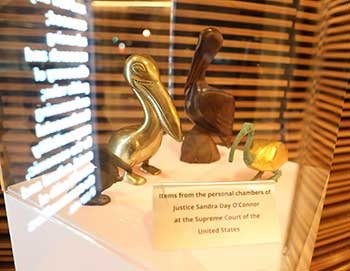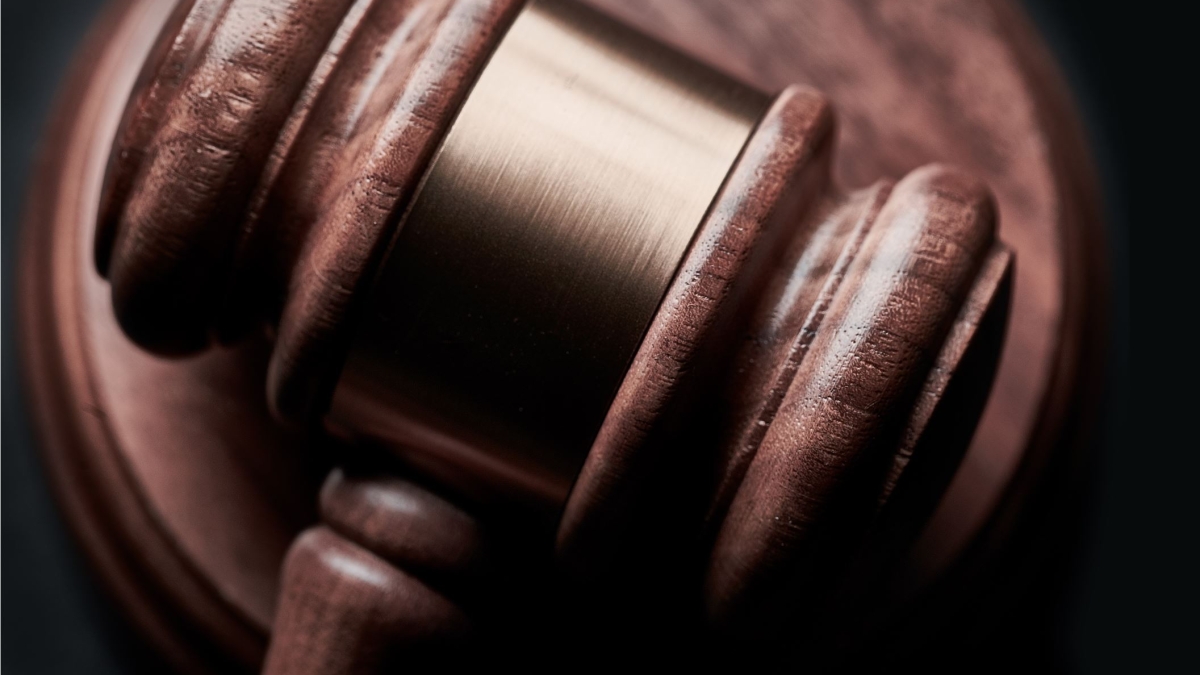On Jan. 4, Arizona State University’s Sandra Day O’Connor College of Law hosted a reception at the Ambassador Barbara Barrett & Justice Sandra Day O’Connor Washington Center to kick off the first of many events in 2020 to celebrate a major milestone, its 50th anniversary.
An array of faculty, students, alumni and others with a connection to ASU Law gathered to mark the occasion for the law school, including Barrett, ASU Law alumna and now U.S. secretary of the Air Force, and Scott Bales, former chief justice of the Arizona Supreme Court who also clerked for O’Connor while she sat on the U.S. Supreme Court.
ASU Law Dean Doug Sylvester told guests that the occasion was notable but not in the traditional way anniversaries would usually be celebrated.
“This is the 50th anniversary of our first graduating class,” Sylvester said. “We think that’s really what you should celebrate — students getting their degrees, becoming attorneys and changing the world.”
Sylvester emphasized some of the school’s accomplishments since its establishment, such as the Indian Legal Program, which has become one of the country’s leading Indian law programs. Students in the program learn how to use their legal training to make a difference in Indian Country by working for tribes, in public service, private practice and nonprofit organizations.
Another unique aspect of the law school that Sylvester and his staff discussed was the school’s programs offered in Washington, D.C., such as the International Rule of Law and Security Program, Indian Legal Program and externship opportunities with the Department of State, Department of Justice, offices of U.S. senators and representatives, national and international law firms, judicial clerkships, including U.S. Court of Appeals for the Federal Circuit, and many others.
“This is a law school that focuses on opportunities for our students at a level of commitment and engagement that no other law school can provide,” Sylvester said. “We’re giving students opportunities that no other law school can offer them.”
ASU Law staff in Washington, D.C., explained why they believe their law school is such a compelling option for students from across the country.
“The opportunities are very unique — they’re boundless,” said Lauren Burkhart, director of Washington, D.C., affairs for ASU Law.
One example Burkhart mentioned was that the Barrett & O’Connor Washington Center is the only American Bar Association-approved separate location of a law school that is in Washington, D.C., which allows ASU Law students to complete up to a full year of their coursework in an ASU facility with ASU faculty during their time in Washington.
“We’re certainly the most innovative law school in the country, and we aren’t afraid to try new things,” said Zachary Kramer, associate dean of faculty for ASU Law. “Students see the excitement, they see the energy and they want to be a part of it.”

Justice Sandra Day O'Connor's personal chamber items are on display at Barrett & O'Connor Washington Center in our nation's capital. Photo by Hager Sharp
Kramer believes that this 50th anniversary of the law school is also an important time to reflect and look forward to new opportunities.
“It’s a good opportunity to think about where we started and where we’re going, and it’s a particularly apt moment to do it in D.C.,” Kramer said. “We’re celebrating not only this beautiful building and its wonderful facilities, but what it means for the law school to be spreading out and truly being a national law school.”
In looking to the future, Sylvester is excited to see ASU Law and its students continue to grow and succeed.
“I just want to see us continue to get our students to opportunities and jobs they desperately want to have and continue to hire the greatest faculty we can hire,” Sylvester said. “I want to see the trajectory we are on continue to go up.”
More Law, journalism and politics

How to watch an election
Every election night, adrenaline pumps through newsrooms across the country as journalists take the pulse of democracy. We gathered three veteran reporters — each of them faculty at the Walter…
Law experts, students gather to celebrate ASU Indian Legal Program
Although she's achieved much in Washington, D.C., Mikaela Bledsoe Downes’ education is bringing her closer to her intended destination — returning home to the Winnebago tribe in Nebraska with her…

ASU Law to honor Africa’s first elected female head of state with 2025 O’Connor Justice Prize
Nobel Peace Prize laureate Ellen Johnson Sirleaf, the first democratically elected female head of state in Africa, has been named the 10th recipient of the O’Connor Justice Prize.The award,…
